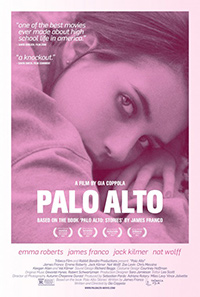My So Called Strife: A Coppola Debuts With a Flurry of Restless Teens
 Hollywood nepotism and the tableau of the teenage wasteland make for oddly striking bedfellows in Palo Alto, the directorial debut of Gia Coppola, granddaughter of Francis Ford, niece of Sofia and Roman. Adapted from a short story collection from James Franco, who also stars, the presence of Emma Roberts and Jack Kilmer (son of Val, who appears in a minor supporting role) adds to the ambience of insulation in this strikingly composed debut. Ultimately, we’ve seen this all before, the woebegone angst of the privileged teen, whether smart or dumb, ambitious or rebellious, angry or hopeful, as told via a series of intersecting personalities that may tweak our own nostalgic memories of that mixed up zenith of apathy and blind motivation. At times profound in its poetry of unfulfilling moments, the material is just as equally banal and not entirely memorable.
Hollywood nepotism and the tableau of the teenage wasteland make for oddly striking bedfellows in Palo Alto, the directorial debut of Gia Coppola, granddaughter of Francis Ford, niece of Sofia and Roman. Adapted from a short story collection from James Franco, who also stars, the presence of Emma Roberts and Jack Kilmer (son of Val, who appears in a minor supporting role) adds to the ambience of insulation in this strikingly composed debut. Ultimately, we’ve seen this all before, the woebegone angst of the privileged teen, whether smart or dumb, ambitious or rebellious, angry or hopeful, as told via a series of intersecting personalities that may tweak our own nostalgic memories of that mixed up zenith of apathy and blind motivation. At times profound in its poetry of unfulfilling moments, the material is just as equally banal and not entirely memorable.
Best friends Teddy (Jack Kilmer) and Fred (Nat Wolff) tend to spend their time getting high and drinking at high school parties, carelessly damaging property as they see fit. Fred’s a bit reckless and unhinged while Teddy is the artistic and introspective type. One night at a party, Teddy bumps into the shy and virginal April (Emma Roberts). The two flirt and they hang out, but Teddy drinks too much and ends up in sexual congress with Emily (Zoe Levin), a promiscuous girl who tries to seek validation through hook-ups with boys at school. Later, Teddy gets a DUI which forces him into a year of probation and community service. As time goes by, Fred ends up seducing Zoe, while April experiences a budding relationship with her soccer coach, Mr. B. (James Franco), whose son she has been babysitting on Saturdays. As each of them navigate their scenarios, April and Teddy gets another chance to reconnect while Fred seems to spin more and more out of control.
A handful of rough patches severely detract from the proceedings, particularly a scene that features the young Kilmer fleeing an accident scene and shortly thereafter, accosted by a policeman in a showdown that feels flaccid and unbelievable. Of the three main protagonists, Kilmer is the weakest link, sometimes appearing to be a bit lifeless, particularly in interactions with adult characters. Unsurprisingly, the adults are lost in their own suburban malaise, either presented as disconnected or downright predatory. Both Teddy and April have sequences where they experience sexual advances from a trusted adult, which play both typically (as with Franco’s lusty soccer coach) and more uncomfortably effective (the stoned Chris Messina).
Franco’s fascination with Faulkner may have been an inspiration for his material here, the three somewhat connected youths of Palo Alto wielding their way through a triptych of distress not unlike, say, Faulkner’s Light In August. To be sure, there’s not the same depth afforded the familiar tropes here as Faulkner manages, but Franco clearly has some compelling ideas. His presence on screen feels a bit smug and self-satisfied, while other adult characters play like caricatures, such as Val Kilmer, who appears to be a big gay uncle, and Don Novello as the hippy art instructor. Emma Roberts and Nat Wolff tend to dominate their scenes effectively and give performances that avoid feeling either blank or over rehearsed.
The choice to set this in the 1990s is an effective stroke, avoiding current clichés of young humans being forced to navigate entirely with and around social media. Yet, soundtrack is a tricky subject here as well, the inclusion of Die Antwoord in a slo-mo party scene reduces the haunt of a bygone ers, yet their proclamations of zef counter culture highlights the common tendencies of the characters and events at hand. Passages of dialogue are presented leadenly, such as an art teacher’s moral lesson about going down the wrong road, which obnoxiously gets revisited in the final frames. Sure to put you in mind of David Robert Mitchell’s 2010 film The Myth of the American Sleepover, it’s a toss-up trying to define which film will be more memorable. While Mitchell’s exercise felt more cohesive, Palo Alto manages to feel more cinematic, even as it sometimes condescends to the same level of the lives its depicting.
★★½/☆☆☆☆☆


